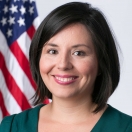
As part of the launch of WhiteHouse.gov/Hispanic, we'll be featuring interviews with Obama Administration staff whose work impacts the Hispanic and Latino communities. This interview is with Raul Perea-Henze of the Department of Veterans Affairs.
What is your key responsibility?
The Assistant Secretary for Policy and Planning at the Department of Veterans Affairs leads policy, strategy and interagency partnerships for the Department. VA is the second largest Cabinet Agency in the Federal Government with 312,000 employees responsible for delivery of health, education, disability and other benefits to 23 million Veterans and their families. 
Where did you grow up? What is your educational background?
Born and raised in Mexico, I started my medical career as a clinician caring for underserved populations in developing countries. Research, academia and global health followed after receiving a Masters degree in Public Health from Yale University, School of Medicine. Most recently, I completed several leadership courses at JFK School at Harvard University, Princeton University and INSEAD, France.
Are you a member of a notable community organization, church, or volunteer/mentorship program?
Public service has been an intrinsic core value in my family for generations. For the past two decades, I have served as a Board Member of several prominent non-profit and philanthropic organizations in the areas of HIV/AIDS, mental health, leadership, Hispanic affairs and human rights.
Over the years, I have also maintained affiliations with other civic organizations that advance the medical profession and global health in a variety of ways, such as the New York Academy of Medicine, the Council of Foreign Relations, the Clinton Global Initiative and the World Medical Association.
During the State of the Union, the President laid out his vision for "Wining the Future" through Education, Building, Innovation, Responsibility, and Reform. How does your role in the Administration help to advance the President's agenda?
The Office of Policy & Planning oversees a $2.5B portfolio of Secretarial priority programs designed to improve services and benefits delivery to Veterans, their families and survivors. I suppose you could say we project the future, plan VA’s response, oversee program implementation, and monitor execution.
Winning the future for Veterans requires VA to work for them in every sense of the word. The President and Secretary Shinseki have demonstrated his commitment to transform the Department into a high-performing, 21st century organization, and we have made significant progress. It is my privilege to lead these transformation initiatives at VA in support of the Administration’s agenda. The Office of Policy and Planning provides many of the essential materials used to build this new VA. For instance, we coordinate VA’s collaboration with the Department of Defense in order to create a seamless transition for service members to Veteran status.
OPP also supports the President’s vision for VA by defining a strategic planning cycle that pushes continuous improvement throughout the Department. We identify emerging trends and project future Veteran needs through in-depth reviews of relevant data and demographic shifts. This analysis informs VA policies, strategies and resource allocation. In order to identify needed reforms, we then test the outcomes of our planning and execution through exhaustive evaluations of VA programs.
How does your work impact the Hispanic community?
One of our responsibilities at the Office of Policy and Planning is to utilize available data to help the Department prepare for future demographic changes. Over 1.33 million Hispanics have served in our military and an estimated 5.8 percent of our Nation’s Veterans are Latinos. As the nation’s Hispanic population soars, the number of Hispanic Veterans will also grow. It’s my privilege to help VA prepare to welcome more Hispanics to the Department.
Another impact of OPP’s work is to help improve outcomes for Hispanic-American Veterans. Overall, Hispanic Veterans are more likely to have a job, more likely to have health insurance and more likely to have earned a college degree. But compared to non-Hispanic Veterans, former Latino armed service members trail in all three categories. By transforming VA into a high-performing 21st century organization, we will create more opportunities for all Veterans to gain an education, receive health care and gain employment.
Raul Perea-Henze is the Assistant Secretary for Policy and Planning at the Department of Veterans Affairs.


